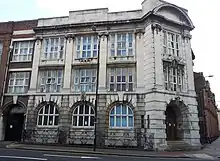Alan Edward Munby FRIBA (16 January 1870 – 19 January 1938) was a British schoolmaster, architect, author, and lecturer, a Fellow of the Royal Institute of British Architects.
Early life
Munby was born in Pendleton, Lancashire, in 1870,[1] the son of F. J. Munby, a solicitor in York.[2] He was educated at Repton School and the University of Durham, where he became a lecturer in chemistry. He also carried out research at Cambridge and Heidelberg, then began a career as a schoolmaster, teaching sciences at Felstead School[3] from 1895.[4] However, he decided to pursue a different profession. From 1902 to 1905 he was articled to the architect Thomas Phillips Figgis (1858–1948) and also studied at the Architectural Association School of Architecture and the Trades Training School.[1]
Career


In 1905 Munby established his own practice as an architect at 28 Martins Lane, Cannon Street, in the City of London, a year before passing his qualifying examination. He spent a year as an assistant to Alfred Cross (1858–1932) before returning to his own practice at 46 New Bond Street, Mayfair. In 1907 he was elected an Associate of the Royal Institute of British Architects and in 1912 a Fellow. His offices were at 9, Old Square, Lincoln's Inn, from 1912. He also lectured on the chemistry of materials and was the author of scientific books and papers.[1] His Introduction to the Chemistry and Physics of Building Materials (1908) runs to 365 pages and was favourably reviewed.[5]
As an architect, Munby specialized in school, university, and hospital buildings, but also carried out some domestic work and alterations.[1]
For more than thirty years Munby was a member of the Science Standing Committee of the Royal Institute of British Architects, of which he became chairman, and he was a strong advocate for better science teaching, for its educational value.[3]
Munby designed Science Laboratories for University College, Bangor, shortly before the First World War broke out in 1914, but they were not built until after it had ended.[6] The Rotunda in Woolwich, designed with T. P. Figgis, a grand building in Portland stone with a high circular hall lit by a lantern, was opened in June 1917, during the war.[7] Munby's Library Building at Gresham's School was opened by Field Marshal Lord Milne in June 1931.[8] Pevsner has called this "classical re-revival".[9]
Munby's Mesnes Building at Wigan College, built for Wigan Grammar School in 1935–1937, was made a listed building in 1997,[10] and his Memorial Building at Bangor was listed in 2008.[11]
Personal life
On 16 August 1910, at Holy Trinity Church, Rugby, Warwickshire, Munby married Ethel Annie Greenhill, the daughter of Alfred Greenhill of Rugby, a surveyor.[12] They had one son, Alan Noel Latimer Munby, and one daughter.[9]
Ethel Munby died at home, 9 Eldon Road, Hampstead, in February 1935.[13] Munby died at the same address in January 1938.[14][1]
Notable buildings
- Rotunda Building, Thomas Street, Bathway Quarter, Woolwich (1917, with T. P. Figgis)[7]
- Departments for Natural Science and Agriculture, University College, Bangor, 1923[1]
- Memorial Building, Bangor, 1923[11]
- East Surrey Hospital extensions, 1924[1]
- Science School for Clifton College, 1926[1]
- Science Building for Highgate School, 1926[1]
- Science Buildings for Beaumont College, Dover College, Shrewsbury School, and Hereford Cathedral School[3]
- Library for Gresham's School, 1931[9]
- Eton Fives / Squash Court for Emmanuel College, Cambridge, 1932–1933[15][16]
- Out-patients’ department, Paddington Green Children's Hospital, 1934 (demolished)[17]
- Former Mesnes Building, Wigan College, 1935–1937[10]
Selected publications
- A. E. Munby, A course of simple experiments in magnetism & electricity (London: Macmillan, 1903)
- Alfred William Stephens Cross, Alan Edward Munby, Practical Notes for Architectural Draughtsmen (London: Technical Journals, 1907)
- A. E. Munby, Introduction to the Chemistry and Physics of Building Materials (London: A. Constable and Co., 1908)
- Alan E. Munby, Laboratories, Their Planning and Fittings (London: G. Bell & Sons, 1921), with introduction by Sir Arthur Everett Shipley
Notes
- 1 2 3 4 5 6 7 8 9 "Munby, Alan Edward", arthistoryresearch.net, accessed 28 September 2023
- ↑ "MR. A. E. MUNBY Noted Architect With Yorkshire Associations" in Yorkshire Post and Leeds Intelligencer, Saturday 22 January 1938, p. 16
- 1 2 3 J. R. S., "Mr. A. E. Munby", Nature 141 (1938), 586–587
- ↑ "FELSTED", Essex Herald, Tuesday 5 March 1895, p. 7; "FELSTED SCHOOL WINTER CONCERT", Chelmsford Chronicle, Friday 17 December 1897, p. 6
- ↑ H. B., "Introduction to the Chemistry and Physics of Building Materials, by Alan E. Munby. Pp. xx + 345. (London: A. Constable and Co., Ltd., 1908)", review in Nature 81 (1909), 62–63
- ↑ "Information 84", (British Brick Society, June 2001) p. 20
- 1 2 Andrew Saint, Peter Guillery, eds., Woolwich: Survey of London Volume 48 (London: Yale Books, 2012, ISBN 978 0 300 18722 9) chapter 5, pp. 250, 272–275
- ↑ The Times, Issue 45859, Friday, 26 June 1931, p. 8, col. F
- 1 2 3 Patrick Wilkinson, Alan Noel Latimer Munby T.D., Litt.D. 1913–1974: A Memoir composed by direction of the Council of King's College, Cambridge (King's College, Cambridge, 1975), p. 2
- 1 2 "FORMER MESNES BUILDING OF WIGAN COLLEGE", Historic England, undated, accessed 29 September 2023
- 1 2 "Memorial Building, including boundary wall and gates, Bangor University A Grade II Listed Building in Bangor, Gwynedd", britishlistedbuildings.co.uk, accessed 29 September 2023
- ↑ Yorkshire Post and Leeds Intelligencer, Wednesday 17 August 1910, p. 6
- ↑ "MUNBY Ethel Annie of 9 Eldon-road Hampstead died 13 February 1935 ...£2346" in Wills and Administrations England and Wales 1935 (1936), p. 486
- ↑ "MUNBY Alan Edward...£21262" in Wills and Administrations England and Wales 1938 (1939), p. 535
- ↑ "Former courts", etonfives.com, accessed 29 September 2023
- ↑ Emmanuel College Conservation Statement, emma.cam.ac.uk, 2016, accessed 29 September 2023
- ↑ "Greater London", historic-hospitals.com, accessed 29 September 2023